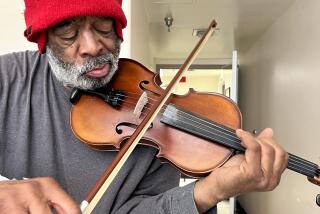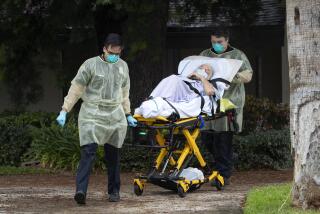‘They killed my dad’: Glendale nursing home sued after resident contracts COVID-19 and dies
- Share via
The wife and children of a 77-year-old man who died after contracting the coronavirus have accused his nursing home of preventing staff from wearing masks and gloves during the pandemic, downplaying the threat of the virus and withholding information about exposure to COVID-19 inside the Glendale facility.
In a lawsuit filed Thursday in Los Angeles County Superior Court, the family of Ricardo Saldana said neither Glenhaven Healthcare nor its owners took any “precautions to identify or isolate employees or residents infected with or exposed to the virus,” one of many lapses that they allege led to his death. At least four other residents have died there, according to health officials.
The litigation is among the earliest filed in California accusing a nursing home operator of a coronavirus response so improper that it amounted to elder abuse, negligence and willful misconduct.
“I’m bringing this case to prevent this from happening to others, and to save lives,” said daughter Jackie Saldana.
She said she alerted Los Angeles County health authorities about the conditions at Glenhaven before filing the suit. “They killed my dad. They could have prevented this,” she said.
The administrator of Glenhaven Healthcare, Carrie Marks, said in a statement that she could not confirm whether Saldana had been a patient there or provide details about care, citing federal privacy restrictions. But Marks said the nursing staff has followed health guidelines put forth by local and federal authorities.
“We can definitively say that Glenhaven Healthcare heroes put our patients first every day,” Marks said in the statement. “We are extremely proud of our ongoing service to our patients and the community during a time of enormous challenges for healthcare providers in our country.”
Nursing homes and other healthcare providers have been lobbying Gov. Gavin Newsom to approve an order that would immunize elder care facilities from lawsuits and prosecutions.
That order has yet to be signed, although similar measures have been adopted in at least a dozen other states. The attorney representing the Saldana family criticized the potential shield as “a terrible idea.”
“The point here is to protect the public, and granting immunity across the board — that would stop the public from preventing egregious conduct,” said Scott Glovsky, a Pasadena lawyer whose firm has represented scores of clients in cases against the insurance industry.
“Any kind of blanket immunity will essentially encourage facilities to cut costs, save money and not have to care for residents,” Glovsky added.
Elder care facilities have increasingly become hot spots of the pandemic’s devastation, with thousands of medically frail residents in close quarters, cared for by staff members who shuttle among rooms and multiple facilities and have limited access to protective equipment. About half of the more than 3,600 deaths related to COVID-19 in California have been linked to nursing homes, and the share of nursing home residents among the dead has grown as the pandemic has persisted.
The concentration of deaths in these facilities prompted the L.A. County Board of Supervisors to consider next week appointing an inspector general to oversee skilled nursing homes. The inspector general would be tasked with evaluating the public health department’s oversight of the county’s roughly 400 nursing homes and, recognizing the political might of metropolitan L.A., identify state and federal policy proposals that could improve nursing home care.
“While some skilled nursing homes may be doing their best to respond to COVID-19, we’ve seen hundreds of deaths at these facilities, tragically exposing the urgent need for stronger oversight across the industry,” said Supervisor Mark Ridley-Thomas, who authored the motion with board Chairwoman Kathryn Barger.
Ridley-Thomas and Barger noted that the county contracted with the state in 2019 to take over the role of investigating complaints and monitoring healthcare facilities, including nursing homes. Last year, the backlog of nursing home investigations stood at 5,000, a stark increase from the backlog reported in 2014: about 3,000.
At Glenhaven Healthcare, the 52-bed facility in Glendale, inspection reports compiled by federal regulators in recent years show several deficiencies, including infection control problems. An inspection last year noted a failure “to ensure that the facility staff performed hand hygiene after touching a potentially contaminated surface or objects and continuing with resident care,” a lapse that can allow infectious illnesses to thrive.
Saldana, who was born in Mexico and came to the U.S. at 20, arrived at Glenhaven in 2014 after having a stroke. Glovsky said Saldana had ailments, including “cardiac issues” and other conditions that put him at particular risk if he contracted the virus that causes COVID-19.
His daughter, Jackie, said she saw him last on the afternoon of March 13. “He was stable,” she said. For the next month, she and others were barred from seeing loved ones at nursing homes.
As the pandemic prompted shutdown orders, Glenhaven did not provide personal protective equipment to staff members. They instead brought their own masks and bandannas, the lawsuit states, but were instructed by administrators to remove them. One nurse was told not to wear a mask, but argued that she was sick and needed the covering to protect colleagues and patients.
“Despite her pleading, and her illness, [the administrator] responded that she was not allowed to wear a mask,” the lawsuit states.
Other alleged mistakes were identified in the lawsuit: One staff member said she was working at a Burbank facility that had a rash of COVID-19 cases, but Glenhaven did not alert employees to the potential exposure and allowed that staffer to continue working.
And Ricardo Saldana was given a new roommate in late March who had previously shared a room with a person who tested positive for COVID-19. Saldana began to develop a fever and other symptoms soon after, according to the lawsuit.
“He looked horrible,” said his daughter. “It’s a nightmare not being able to be there for your loved ones.”
He was eventually transferred to Glendale Memorial Hospital, where he died April 13. His death certificate, which was filed with the lawsuit, listed viral pneumonia and COVID-19 among the causes. Saldana was buried last month at Oakdale Memorial Park in Glendora.
More to Read
Sign up for Essential California
The most important California stories and recommendations in your inbox every morning.
You may occasionally receive promotional content from the Los Angeles Times.











